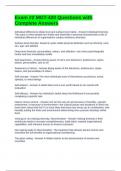Exam #2 MGT-420 Questions with
Complete Answers
Individual Differences (deep level and surface level traits) - Answer-Individual Diversity-
The ways in which people are similar and dissimilar in personal characteristics (mix of
individual differences in organizations creates workforce diversity)
Surface-level diversity- based on quite visible physical attributes such as ethnicity, race,
sex, age, and abilities
Deep-level diversity- personalities, values, and attitudes—are more psychologically
innate and less immediately visible
Self-awareness - Answer-Being aware of one's own behaviors, preferences, styles,
biases, personalities, and so on
Awareness of others - Answer-Being aware of the behaviors, preferences, styles,
biases, and personalities of others
Self-concept - Answer-The view individuals have of themselves as physical, social,
spiritual, or moral beings
Self-esteem - Answer-A belief about one's own worth based on an overall self-
evaluation
Self-efficacy - Answer-An individual's belief about the likelihood of successfully
completing a specific task
Nature versus nurture - Answer-Are we the way we are because of heredity—genetic
endowment, or because of environment—the cultural places and situations in which we
have been raised and live? It is most likely that these two forces act in combination, with
heredity setting the limits and environment determining how a person develops within
them
Valuing (or not valuing) diversity: Discrimination - Answer-Valuing diversity in their
workforces leads to increase competitiveness, build talent, expand organizational
capabilities, and enhance access to diverse customers
Not valuing leads to Discrimination- The treatment that actively denies women and
minorities the full benefits of organizational membership.
The glass ceiling - Answer-A hidden barrier to the advancement of women and
minorities
,Leaking pipeline - Answer-Describes how women drop out of careers before reaching
the top levels of organizations
leadership double bind - Answer-Describes how women are seen as weak in leadership
if they conform to the feminine stereotype and also weak if they go against it... damned
if they do, doomed if they don't
Social identity theory In-group membership; out-group membership - Answer-Social
identity theory- theory developed to understand the psychological basis of discrimination
A feeling of in-group membership exists when individuals sense they are part of a group
and experience favorable status and a sense of belonging.
A feeling of out-group membership exists when individuals sense they are not part of a
group and experience discomfort and low belongingness.
This in-group favoritism occurs at the expense of the out-group. In terms of diversity,
social identity theory suggests that simply having diversity in groups makes that identity
salient in peoples' minds
"Big Five" personality dimensions- OCEAN - Answer-Openness to experience —degree
to which someone is curious, open to new ideas, and imaginative
Conscientiousness —the degree to which someone is responsible, dependable, and
careful
Extraversion —the degree to which someone is outgoing, sociable, and assertive
Agreeableness —the degree to which someone is good-natured, cooperative, and
trusting
Emotional stability —the degree to which someone is relaxed, secure, and unworried
Social traits- learning styles - Answer-Social traits- surface-level traits that reflect the
way a person appears to others when interacting in various social settings
Sensation- prefer routine and order and emphasize well-defined details in gathering
information; they would rather work with known facts than look for possibilities.
Intuitive- prefer the "big picture." Like solving new problems, dislike routine, and would
rather look for possibilities than work with facts.
Feeling-type- are oriented toward conformity and try to accommodate themselves to
other people. They try to avoid problems that may result in disagreements.
Thinking-type- use reason and intellect to deal with problems and downplay emotions.
, Personal conception traits Locus of control; proactive personality;
authoritarianism/dogmatism, Machiavellian; self-monitoring - Answer-Personal
conception traits- show up as personal beliefs and orientations toward settings and
issues
Locus of control- extent to which a person feels able to control his or her own life
Internal locus of control- believe that they control their own fate or destiny
External locus of control- believe that much of what happens to them is beyond their
control and is determined by environmental forces (such as fate)
Proactive personality- is the disposition that identifies whether or not individuals act to
influence their environments
Authoritarianism- is a tendency to adhere rigidly to conventional values and to obey
recognized authority
Dogmatism- leads a person to see the world as a threatening place and to regard
authority as absolute
Machiavellianism- causes someone to view and manipulate others purely for personal
gain
Self-monitoring- is a person's ability to adjust his or her behavior to external situational
(environmental) factors
Emotional adjustment traits Type A; Type B - Answer-Emotional adjustment traits are
traits related to how much an individual experiences emotional distress or displays
unacceptable acts
Type A orientations tend to be impatient, achievement oriented, perfectionist and
competitive
Type B orientations tend to be easygoing and less competitive
Stress - constructive (eustress); destructive (distress); sources of stress (work, life);
(burn out and workplace rage) - Answer-Eustress- Constructive stress that results in
positive outcomes for the individual ex. study hard before exams, pay attention
Distress-Destructive stress that is dysfunctional for the individual ex. regular attendance
to absent, punctuality to tardiness
Work stress- high or low task demands, role conflicts or ambiguities, poor interpersonal
relations, career progress that is either too slow or too fast




